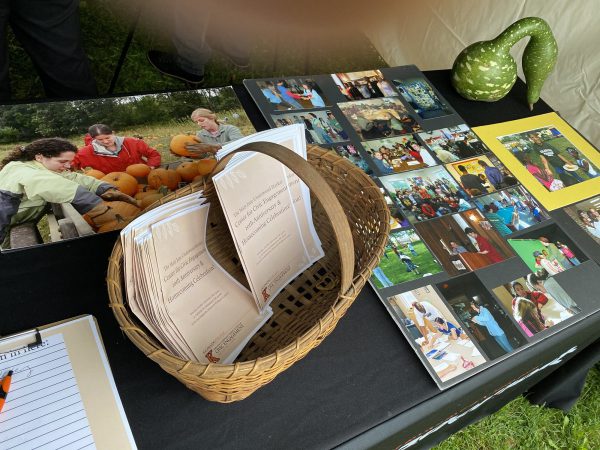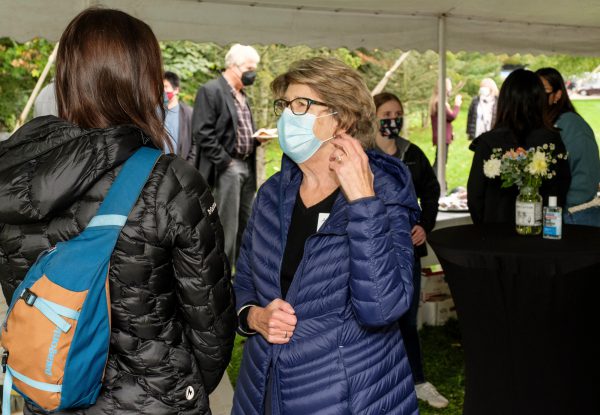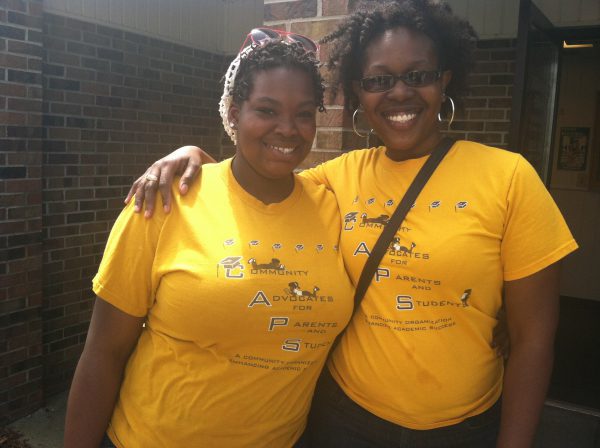
at Homecoming 2021. More than 150 alumni, students, faculty, staff
and community partners reunited to share stories, photographs and
their memories of accomplishments.
For 20 years, the Mary Jane Underwood Center for Civic Engagement (CCE) has prepared students to build a more just, equitable and sustainable world, starting here in Kalamazoo.
Civic engagement takes place in courses and research, through student-led programs, and during summer internships, all involving long-term community partnerships. Within these interconnected programs and partnerships, students work alongside local residents and organizations to address complex and interrelated issues in food justice, educational and health equity, neurodiversity, reproductive rights, youth development, girls’ leadership and immigrant rights. Through thoughtful and ethical engagement, students gain skills, knowledge and critical perspectives that prepare them well for meaningful careers and a lifelong commitment to the public good.
Among its many endeavors, the CCE:
- Works with faculty to develop and support more than 20 community-based courses, offering logistical support, small grants and faculty stipends, pedagogy workshops and community connections.
- Trains, guides and supervises students who get hands-on experience as paid civic engagement scholars coordinating ongoing community partnerships. They lead their peers—more than 200 students in a typical term—who work in Kalamazoo organizations that promote literacy, youth development and college attainment; food security and sustainability; immigrant rights and the arts. Students work every week and can earn their federal work study or serve as volunteers with programs that include Kalamazoo Public Schools, Kalamazoo County ID and Juvenile Home, Goodwill Adult Literacy and other non-profits.
- Administers the Summer Community Building Internships (CBIs) program that connects K students with at least 20 of the CCE’s local partners, from AACORN Farms to the YWCA of Kalamazoo. Interns, selected with assistance from K’s Center for Career and Professional Development (CCPD) and the Financial Aid Office, are on the job for 30 to 40 hours a week for six weeks while earning a stipend, meeting as a group with CCE staff for dinner and reflection once a week.

guests at the CCE’s 20th anniversary party at Homecoming.
In the mid- to late 1990s, a national movement to connect communities and campuses inspired a small group of faculty, staff and community partners to do just that. Those who participated in these service-learning classes observed that they could be of reciprocal benefit to community residents, organizations, K students and the College itself. The College’s long commitment to experiential learning and the K-Plan made it receptive to these civic engagement initiatives, which are rooted in the liberal arts.
“This work grew straight out of the College’s mission and history,” said Alison Geist, the director of the CCE and K’s Community and Global Health concentration. “It is a renewal and recommitment to K’s fellowship in learning, not just on campus but in Kalamazoo. For more than 50 years, K had been sending students across oceans to study. What about encouraging students to cross the street to learn from our own community? So K was ready to support the idea of students engaging locally through courses and then on an ongoing basis.”

and guests at the Center for Civic Engagement’s 20th
anniversary party.
Among their first course-based partnerships were two that remain vital today. Building Blocks, an organization supporting low- to medium-income neighborhood-association projects, was founded in 1995 through a sociology course at K offered by Professor Emeritus Kim Cummings. In addition, a partnership with Woodward Elementary, a Kalamazoo Public School two blocks from campus, was seeded when Kenneth Mulder ’92, who was teaching in K’s math department at the time, arranged for students in his calculus class to tutor there.
The success and the potential of these initiatives, for both K and its partners, inspired Ronda Stryker and Bill Johnston to endow the Center in 2001 with a $1.5 million gift that honors her grandmother, Mary Jane Underwood Stryker, a schoolteacher; and Stryker’s friend, Marilyn LaPlante, a former dean of students at K. This endowment and vote of confidence, along with grants from national and local organizations, enabled the CCE to expand its programming and gradually grow. With anonymous donations, endowments from alumni and space in Dewing Hall, the CCE took its place among the College’s Centers for Experiential Learning, and today works with about 45 community partners.
If the last 20 years is an indication, the CCE will keep changing and growing.
“Civic engagement is necessary for democracy to thrive, and like anything we study, it takes both theory and practice to learn,” Geist said. “Ideally, learning from communities should be woven throughout the curriculum and into the lives we lead after K. That’s why we’re developing new ways to intertwine and integrate community-based learning on and off campus across disciplines and boundaries and connect alumni and current students to inspire one another as they work on compelling contemporary issues.”
Alumni Praise Their Civic Engagement Experiences

for Parents and Students.
The CCE kicked off its platinum anniversary this fall with a party at Homecoming 2021. More than 150 alumni, students, faculty, staff and community partners reunited to share stories, photographs and the accomplishments of thousands of students and dozens of community partners who have collaboratively contributed to the city we call home.
The event was held in a tent next to the campus Hoop House, a CCE-led initiative imagined, built and maintained by students in the Just Food Collective, and their staff mentor, Amy Newday. At the event, the CCE presented video testimonies from K alumni who have participated in its programs over the past 20 years to mark its anniversary. Among those who credit the CCE with influencing their pathways and passions is J. Cooper Wilson ’11, a teacher in New York City Public Schools, who volunteered to tutor non-native English-speaking students in Kalamazoo schools during his time at K.
“When you become a Civic Engagement Scholar, you are the leader who runs your program,” Wilson said. “It’s a combination of student leadership and a comprehensive vision of social change that makes the CCE really special.”
Sashae Mitchell ’13 learned of the CCE during her first weeks on campus, shortly after arriving from her native Jamaica. She ended up participating in a couple of CCE programs, including Community Advocates for Parents and Students (CAPS) as a tutor. The program, founded by Kalamazoo educators, offers enrichment programs for youth who live at Interfaith Homes Neighborhood Network Center, making it accessible for the youth and their families who live there.
“I fell in love with CAPS, I fell in love with the students, I fell in love with the people in charge of CAPS, and I felt like that was my thing,” Mitchell said. “It was my niche. Sometimes at K, I didn’t feel like I belonged or that it was my space. Interfaith Homes gave me that sense of belonging.” Mitchell, who also worked as a staff member in the CCE for a year after graduation, now runs her own math education business in Jamaica.
Arianna Schindle ’08 chose Columbia University in New York over K when she began her journey in higher education. At the time, she worked for a conflict-resolution group called Seeds of Peace. However, she desired more opportunities to pursue social justice within community engagement.
Schindle reapplied and transferred to K. Today, Schindle is the founder of the Rhiza Collective, a women-led group of cultural workers and facilitators using storytelling, healing, organizing and research to support social transformation and environmental justice.
“I think community engagement is something all colleges and universities should do,” Schindle said. “It’s taking learning and putting it into action. You transform the community with every lesson you learn. It’s seeing learning as something that lives outside our classrooms. It connects people in the community with some of the vital resources universities can offer, including students, energies, time and new learning.”
